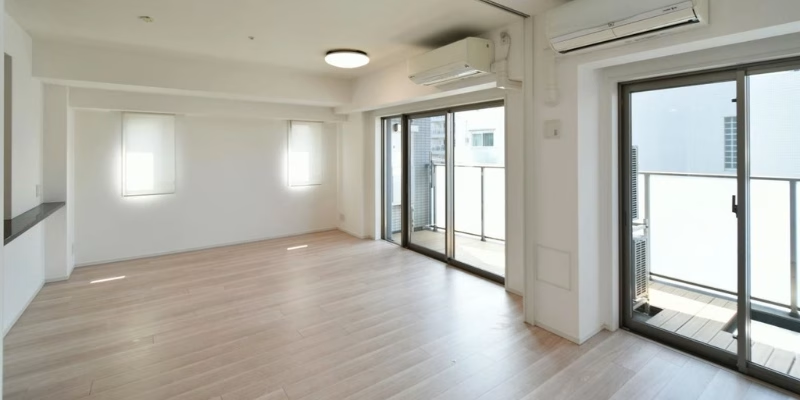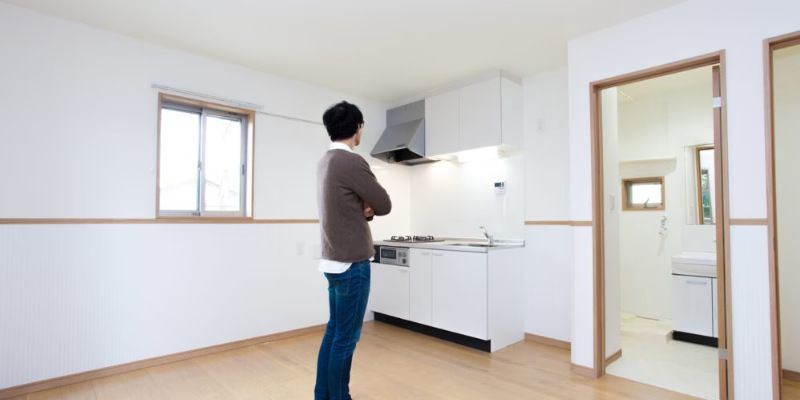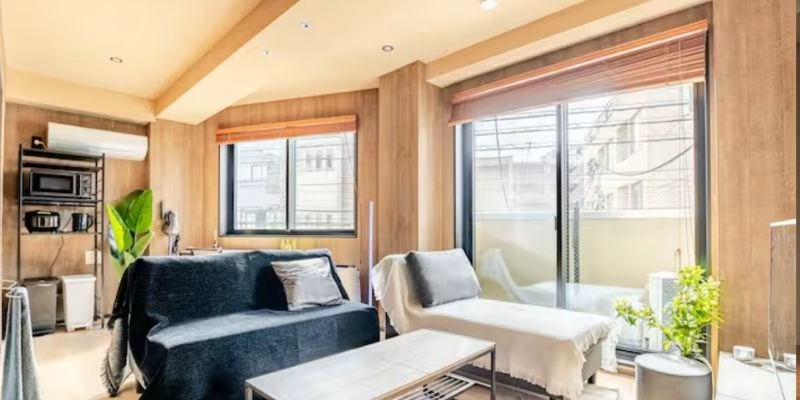Types of rental housing in Japan vary widely, from affordable shared houses to modern serviced apartments and spacious family homes. For newcomers searching for an apartment for rent Tokyo or exploring rentals in Tokyo Japan, understanding the difference between short-term and long-term contracts is essential. While apartments in Japan often come unfurnished and require higher upfront costs, short-term options provide convenience with fully furnished units. By learning how apartments in Japan Tokyo are structured, you can choose the rental style that fits your lifestyle, budget, and length of stay.
Japan’s Rental Housing Landscape
Japan has one of the most structured rental markets in the world. In major cities like Tokyo, Yokohama, or Osaka, demand is extremely high, and tenants often face complex contracts that include deposits, non-refundable “key money,” and the need for a guarantor. At the same time, the market has become more flexible in recent years. Many companies now offer furnished units, serviced apartments, and shared houses that are specifically designed to help newcomers settle in quickly.
Broadly speaking, there are two main categories of rental housing:
- Long-term rentals, which involve standard two-year contracts, are most suitable for expats, families, and professionals who plan to stay in Japan for an extended period.
- Short-term rentals, which include serviced apartments and shared houses, are designed for students, interns, business travelers, or digital nomads who only need accommodation for a few months.
With this distinction in mind, let’s examine each housing option in greater depth.

Apartments in Japan: The Default Choice
Most people who search for an apartment for rent in Tokyo or elsewhere in Japan will encounter two main styles: lightweight apartments and reinforced concrete “mansions.” Although the term “mansion” might sound luxurious, it usually refers to standard mid-range buildings with stronger soundproofing and durability compared to wooden apartments.
Short-Term Rentals in Japan: Flexibility and Convenience
Short-term rentals are becoming an increasingly important part of Japan’s housing market, especially in cities like Tokyo, Osaka, and Kyoto where mobility is high. Unlike traditional two-year leases, these arrangements are designed for people who only plan to stay for a few weeks to several months. They are particularly popular with professionals on temporary assignments, exchange students, digital nomads, and long-term travelers who want more independence than a hotel can provide.
The biggest advantage of short-term rentals is flexibility. Most of these apartments are furnished, with essential appliances, internet access, and utilities included in the rent. Cleaning services are often available as well, making the experience closer to a hotel stay but with more privacy. Another benefit is the reduced financial burden: tenants avoid paying key money, large deposits, and agency fees that are standard in long-term leases. While the monthly rent is higher than that of a comparable unfurnished apartment, the overall cost is often lower when considering the absence of upfront payments and the convenience of move-in readiness.
That said, availability can be limited, particularly outside of Tokyo. In addition, Japan regulates short-term stays strictly. Platforms such as Airbnb exist, but only licensed operators can legally rent properties on a daily or weekly basis. As a result, many foreigners turn to serviced apartments or corporate housing companies that specialize in legal, short-term accommodations. These providers market themselves as foreigner friendly apartments Tokyo, offering English-language support and simple contracts.
In practice, short-term rentals are best for people who need a temporary base:
- Business travelers and corporate assignees who expect to relocate within a year.
- Students participating in exchange programs or short-term study courses
- Digital nomads and freelancers seeking mobility and convenience.
- Families exploring relocation who want to “test the waters” before committing to a long-term lease.
For anyone in these categories, choosing an apartment for rent in Tokyo under a short-term contract can be a cost-effective and stress-free way to live in Japan without the barriers of the traditional leasing system.

Long-Term Rentals in Japan: Stability and Commitment
Long-term rentals form the backbone of Japan’s housing system. Most standard contracts run for two years, with the expectation of renewal if the tenant wishes to stay longer. Unlike short-term housing, long-term rentals require a greater level of commitment, both financially and contractually. Tenants are often expected to pay a refundable deposit (敷金 shikikin), non-refundable key money (礼金 reikin), a guarantor fee, and sometimes a renewal fee after the first two years. For newcomers, these costs can be surprising, but they also provide stability, once the contract is signed, the monthly rent rarely changes, and tenants have the security of a long-term home.
One important characteristic of long-term apartments in Japan is that they usually come unfurnished. It is common for tenants to buy their own appliances, including refrigerators, washing machines, and even light fixtures. While this may appear inconvenient, it also allows residents to personalize their living space and save money over time, since furnished apartments usually carry a premium. Families and professionals often view this as an investment in their quality of life, particularly if they expect to remain in Japan for several years.
Long-term rentals are best suited for residents who want a stable base and are prepared to navigate the traditional Japanese rental process. These include:
- Expats on multi-year contracts who want to settle near workplaces or international schools.
- Students enrolled in full-degree programs, who need affordable housing for several years.
- Families relocating to Japan, who prioritize stability, space, and proximity to community resources.
For these groups, committing to a Japan Tokyo apartment rent arrangement or a home in suburban areas can be far more cost-effective in the long run compared to paying the premium for short-term convenience. It also opens the door to a wider selection of housing, from modest apartments in Tokyo to spacious homes for rent in Japan’s quieter neighborhoods.

If you are planning your next move, check out our featured apartment listings in popular areas across Japan:
Tokyo Apartments – Modern city living
Kanagawa Apartments – Close to Yokohama & the bay
Saitama Apartments – Affordable and convenient
Chiba Apartments – Tradition meets comfort
Long-Term vs. Short-Term Rentals in Japan
For many newcomers, the choice between a short-term rental and a long-term lease is one of the first big decisions to make. Both options have clear advantages and drawbacks depending on budget, lifestyle, and visa status. Short-term rentals such as serviced apartments or shared house Tokyo offer flexibility and convenience, while long-term apartments in Tokyo to rent provide stability and lower monthly costs.
The chart that follows presents the core variations:
Aspect | Short-Term Rentals | Long-Term Rentals |
Contract Length | Flexible (monthly or up to 6–12 months) | Standard 2 years (sometimes 1 year), renewable |
Furnishing | Fully furnished (bed, kitchenware, Wi-Fi, utilities) | Usually Unfurnished; tenants must buy appliances & furniture |
Move-In Process | Simple paperwork, usually no guarantor needed | Complex paperwork, guarantor/company often required |
Upfront Costs | Lower initial payment, offset by higher monthly fees | High move-in fees (4–6 months’ rent), but lower monthly rent |
Costs by Layout (in Tokyo) | 1R/1K: 120,000 –150,000 yen/month (furnished) 1DK/1LDK: 150,000–200,000 yen/month (furnished) 2LDK+: 200,000+ yen/month (furnished) | 1R/1K: 70,000 –100,000 yen/month (unfurnished) 1DK/1LDK: 100,000 –150,000 yen (unfurnished) 2LDK+: 150,000–200,000 + yen (unfurnished) |
Monthly Rent | Expensive (1.5–2× long-term rate) | More affordable once settled |
Eligibility | Available to tourists, short-stay visa holders, expats new to Japan | Requires valid visa (work, student, long-term residence) and proof of financial stability |
Flexibility | Easy to move out with short notice | Early termination penalties (1–2 months’ rent) |
Use Cases | Best for newcomers, business travelers, digital nomads | Best for residents, families, or long-term professionals |
Residency Registration | Often not possible for official residency registration | Eligible for residency registration, banking, schools |
If you plan to settle in Japan for years and want a stable home, long-term rentals offer better value despite the higher initial costs. If your stay is temporary, short-term housing provides convenience and flexibility, even if monthly rent is higher. Either way, working with a reliable, foreigner friendly apartments Tokyo agency can save you time, money, and stress.
What Happens If You Cancel Your Lease Early in Japan?
In Japan, ending a long-term rental contract before its expiration is possible, but it usually comes with obligations that tenants need to prepare for. Most contracts require advance notice and may include penalties or deductions from your deposit. Understanding these conditions helps you avoid unexpected stress and costs when planning to move out earlier than expected.
Common consequences of early lease cancellation include:
- Advance notice requirement: Usually one to two months before your desired move-out date.
- Early termination fee: Some contracts include a penalty for breaking the lease ahead of time (often equal to 1 month’s rent).
- Deposit deductions: Landlords may keep part of your security deposit to cover cleaning or repairs (depending on the property size).
- Additional costs: In some cases, tenants may be charged for re-leasing or administrative fees (typically 30,000–60,000 yen).
By checking the terms carefully and discussing with your landlord or agency, you can handle the process more smoothly and reduce unnecessary expenses.

The Reality of Upfront and Ongoing Costs
Moving into a long-term apartment for rent in Tokyo can be more expensive than many expect. Beyond rent, tenants often face upfront payments such as deposits, key money, agency fees, and guarantor fees, altogether adding up to four to six months’ rent before moving in. Monthly management fees also add to ongoing costs.
Planning ahead and understanding these expenses is essential before signing a lease. Read a full guide on upfront rental costs in Japan.
Location Choices: City vs. Suburbs
Choosing the right location for a long-term apartment for rent Tokyo is just as important as the layout. Central Tokyo wards like Minato, Shibuya, and Chiyoda offer convenience for professionals, embassies, and international schools, but the price is high. Rents in these areas can easily exceed ¥300,000 for a modest two-bedroom apartment.
For those who prefer more space, suburban areas such as Setagaya, Kichijoji, or Nerima are popular. These neighborhoods are more relaxed, with parks and family-friendly amenities. A slightly longer commute often means twice as much space for the same price. Beyond Tokyo, cities like Osaka and Kyoto offer vibrant urban lifestyles at lower rents, while Yokohama and Kawasaki provide an attractive middle ground, close to the capital but more affordable.
When selecting a location, tenants must also consider access to train lines. Japan’s cities are built around public transport, and being within walking distance of a major station can save hours each week. For long-term renters, this decision goes beyond just rent, it also involves daily living expenses. Living far from the center usually lowers rent and food costs, but commuting becomes a major factor. Choosing an area with a direct train line to the workplace is a smart way to balance affordability with convenience, especially for those who want to save money over a two-year contract.
Challenges Foreign Tenants May Face
Despite Japan’s modern infrastructure, foreigners often encounter challenges when seeking apartments for rent in Tokyo Japan. The following are some typical issues to keep in mind:
- One of the most common is the guarantor requirement. Traditionally, tenants needed a Japanese relative or employer to co-sign the lease, which is not possible for many expats. While guarantor companies now provide an alternative, they charge additional fees.
- Language is another barrier. Rental contracts are written in Japanese, often in complex legal language. Misunderstandings can lead to disputes about rent, repairs, or moving-out conditions. Some landlords are also hesitant to rent to foreigners, worrying about cultural differences or communication difficulties. In addition, many property managers prefer tenants who can handle basic Japanese communication, since issues like maintenance requests or neighborhood matters are usually conducted in Japanese.
- Financial security is also a major concern. To be approved for a two-year lease, tenants are often required to prove their ability to cover rent for the duration of the contract. This may include showing income records, employment contracts, or bank statements. Without this, landlords may consider the risk too high.
- Beyond paperwork, cultural understanding matters. Japanese apartments typically come with strict lifestyle rules, from separating trash correctly to keeping noise levels down. Violating these can strain relationships with neighbors or even lead to termination of the lease. For this reason, familiarity with local living etiquette is just as important as meeting financial or visa requirements.
Life Cycle of a Lease: Renewal and Moving Out
Most apartments in Japan Tokyo are rented under two-year contracts. At the end of this period, tenants may renew by paying a renewal fee, usually equivalent to one month’s rent. Moving out also involves specific rules. Apartments must be restored to their original condition, a concept known as genjō kaifuku. This means removing personal fixtures and repairing any damage beyond normal wear.
Deposits are refunded after deducting cleaning fees and repair costs. Something as simple as nail holes in the wall can reduce the refund by thousands of yen. Understanding these expectations in advance helps tenants avoid unpleasant surprises when leaving.
Other Choices Instead of Long-term Leasing
While long-term rentals are the most stable option, alternatives do exist. Serviced apartments provide furnished spaces for shorter stays, though the rent is higher. Share houses are popular among students and young professionals, offering lower costs and a sense of community. Some companies also provide housing for employees, easing the burden of searching independently.
Nevertheless, for anyone planning to build a life in Japan, a long-term apartment rental remains the best choice. It offers privacy, security, and the ability to settle into a neighborhood and routine.
Start Your Japan Journey with Confidence through Arealty
For many first-time renters in Japan, the housing process can feel overwhelming. Guarantor requirements, complex paperwork, and language barriers often make securing a place more difficult than expected. Partnering with a reliable real estate agency can take away much of that stress.
Why Choose Arealty?
Arealty specializes in helping international residents find apartments in Tokyo, with services designed to remove the common barriers foreigners face:
- Multilingual support – Professional guidance available in English, Japanese, and Vietnamese.
- Local expertise – In-depth knowledge of Japan’s rental system and the unique challenges for non-Japanese tenants.
- Comprehensive assistance – From searching and viewing to contracts and moving in, Arealty stays with you every step.
- Clear communication – Transparent processes and a customer-first approach, so you always know what to expect.
Arealty makes moving into your new home in Japan simple and hassle-free. Instead of worrying about paperwork and regulations, you can focus on pursuing your career, studies, and personal life.
Contact: 050-6864-9697
Website: https://arealty.jp
Conclusion
Japan offers a wide range of rental housing options, from compact apartments in Tokyo to spacious homes for rent in Japan’s suburbs. For short-term stays, serviced apartments and shared houses provide flexibility, while long-term residents often choose traditional apartments or detached houses. Whether your priority is cost, space, or convenience, there is a solution for every lifestyle.
At Arealty, we specialize in guiding newcomers through the complexities of the market, offering everything from Japan Tokyo apartment rent listings to foreigner friendly apartments Tokyo. Whether you are looking for long-term stability or short-term flexibility, our team ensures that your experience of renting in Japan is smooth and stress-free.






Leave a Reply